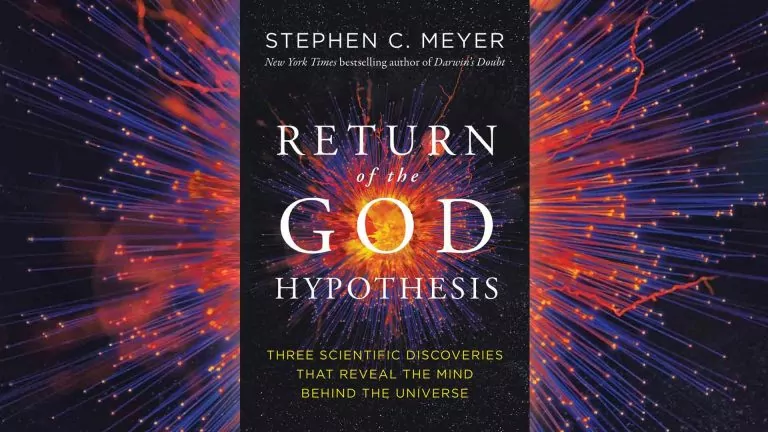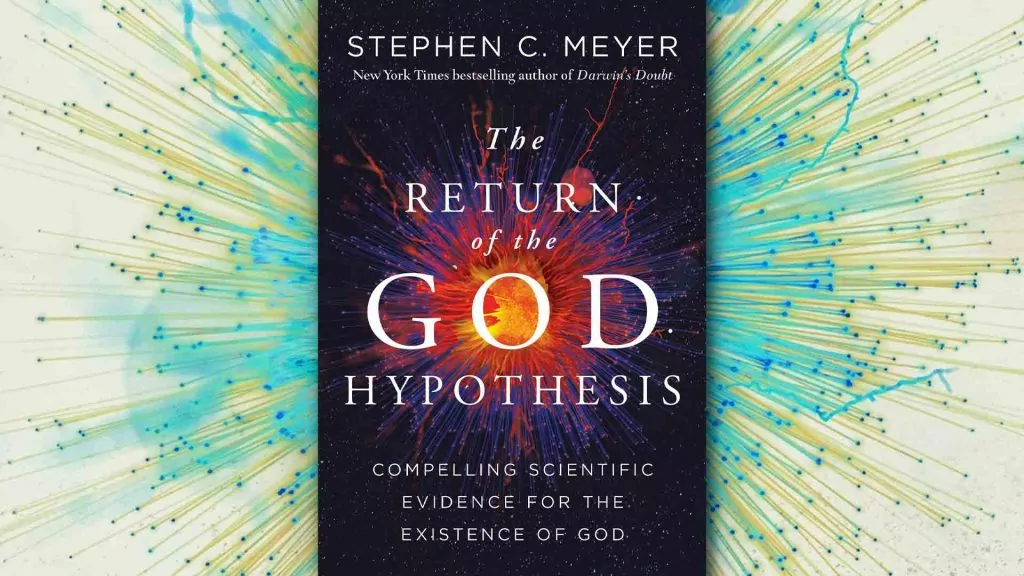Three Scientific Discoveries that Reveal the Mind Behind the Universe
by Stephen C. Meyer
568 pages / 2021
Stephen Meyer’s impetus to write Return of the God Hypothesis came from a debate at the University of Toronto’s Wycliffe College in March 2016. Our family actually watched this event. The topic concerned whether we can see evidence of God’s handiwork in nature, and three very different viewpoints were represented: professing Christian Stephen Meyer, atheist Lawrence Krauss, and theistic evolutionist Denis Lamoureux. From the start it was an organizer’s worst nightmare in that Lawrence Krauss led off using a good proportion of his time not to debate, but to make light of Stephen Meyer, remarking that if he had known that his opponent was to be someone with the poor credentials of Meyer, he (Krauss) would never have come. Worse still, Stephen Meyer rose to speak, but the bright lights brought on a migraine headache such that he could scarcely see or speak. While he had come intending to take on Krause’s “universe from nothing” views, his condition did not permit this to be the time nor the place. But this missed opportunity motivated Meyer to create another – after much additional research, this book became the time and the place!
But it isn’t just Lawrence Krauss that Meyer addresses here. He tackles the claims of both Krauss, America’s most prominent scientific atheist, and those of Stephen Hawking who was, until his death in 2018, the world’s best-known scientist and atheist. These men both claimed to have demonstrated that the universe spontaneously appeared from nothing. In a posthumously published book, Hawking declared: “No one created the universe and no one directs our fate.” In response, Stephen Meyer confides:
“Reading Hawking’s final words saddened me not only for Hawking, but also for the many millions of people who have long labored under the impression that the testimony of nature renders belief in God untenable.”
Meyer shares that as a teen, he himself was saddened by the futility of such a life, one without God. So he’s written a book that would have benefited his teenage self – Return of the God Hypothesis is a refutation of Hawking’s atheistic message. Thus, Meyer replies to Hawking:
“[My] book has better news: ….Not only does theism solve a lot of philosophical problems, but empirical evidence from the natural world points powerfully to the reality of a great mind behind the universe. Our beautiful, expanding, and finely tuned universe and the exquisite, integrated, and informational complexity of living organisms bear witness to the reality of a transcendent intelligence – a personal God.”
Order gives evidence of an “Orderer”
Stephen Meyer begins his book by pointing out that it was the Judeo-Christian doctrine of creation that first fostered the development of science in the Christian West. These early philosophers realized that nature was the product of a rational God. Stephen Meyer, therefore, declares that, indeed:
“the monotheistic worldview of the ancient Hebrews suggested a reason to expect a single coherent order in nature and thus a single, universally applicable set of laws governing the natural world.”
Obviously, scientists did not retain those initial views. Enlightenment ideals led to skepticism about God and emphasis on the value of human reason alone, which also promoted materialism – this is the idea that matter and energy should be understood as the sole foundations of reality. Soon scientists were declaring that only materialistic explanations of nature were legitimately scientific. Therefore,
“By the beginning of the twentieth century, science – despite its theistic beginnings – seemed to have no need of the God hypothesis.”
Key scientific discoveries
With this background, Stephen Meyer now begins to consider biology, chemistry and especially physics.
Everything didn’t come from nothing
The particular interest of most theoretical physicists is to explain where everything came from. We soon discover that there are no physical explanations of origins which do not need a causal intelligence (a creator). We have all heard about the big bang, but not so many people realize that extrapolation of the mathematics back from the present, continues on to zero, the “singularity.” In Meyer’s words:
“…Hawking, Ellis and Penrose’s singularity proofs … implied that a materialistic universe of infinite density began to exist some finite time ago starting from nothing – or at least from nothing spatial, temporal, material or physical.”
The cause, then, of a beginning would have to come from something outside of nature – something (or rather, Someone) supernatural! As young earth creationists, we have our own (eye-witness) account of the universe’s origins, but we can appreciate how God has so arranged things, that even the Bible-rejecting materialist can’t escape the implication that the universe had a supernatural origin. Of course, atheists certainly do not want to contemplate this idea.
An incredibly finely tuned universe
In the 1980s, there was more bad news for the atheists. When physicists studied the physical forces and natural laws governing all nature, they discovered a “curious thing.” Forces like gravity, or electromagnetism exhibit extremely precise values and constants which cannot be otherwise if life is to exist. Thus, Stephen Meyer points out that:
“…the number [Oxford physicist Roger] Penrose calculated – 1 in 1010123 – provides a quantitative measure of the unimaginably precise fine tuning to the initial conditions of the universe….The mathematical expression 1010123 represents what mathematicians call a hyper-exponential number – 10 raised to the 10th power (or 10 billion) raised again to the 123rd power. To put that number in perspective, it might help to note that physicists have estimated that the whole universe contains ‘only’ 1080 elementary particles (a huge number – 1 followed by 80 zeros). But that number nevertheless represents a minuscule fraction of 1010123. In fact, if we tried to write out this number with a 1 followed by all the zeros that would be needed…there would be more zeros… than there are elementary particles in the entire universe…. I’m not aware of a word in English that does justice to the kind of precision we are discussing.”
Even more bad news for the atheists is that “the specific values of the constants represent features of the laws themselves, not aspects of nature that the laws could conceivably explain.” A causal agent is required, neither “nature” nor “nothing” will do.
Atheist answers aren’t coming
Enter to the scene the quantum cosmologists like Lawrence Krauss and Stephen Hawking who most emphatically did not want to admit any need for God to explain origin of the universe. Quantum cosmology attempts to “explain the origin of our universe as the outcome of a set of possibilities described by the mathematics of quantum mechanics.”
Quantum cosmologists such as John Wheeler and Bryce DeWitt developed an equation that synthesizes mathematical concepts from quantum mechanics and general relativity. Solving their equation,
“allows physicists to construct a wave function for the universe. That wave function describes different possible universes with different possible gravitational fields, that is different curvatures of space and different mass-energy configurations (or matter fields).”
The problem for scientists doing these calculations is that the range of possibilities is so huge, and the characteristics of our fine-tuned universe are so precise that they have to choose what values to include in the equations. But explaining why nature would choose such arbitrary values has proved difficult for those people “that attempt to explain how the universe emerged from nothing.”
And there are other problems for quantum cosmologists. “If the medium of math is the mind, does this mean that mind should predate universe?” Indeed “we have no experience of mathematical equations creating reality.” Thus Stephen Meyer insists that quantum cosmology “attributes causal powers to abstract mathematics and depends upon intelligent inputs of information from theoretical physicists as they model the origin of the universe.”
The highlight of this discussion and the book itself is that: “quantum cosmology implies the need for an intelligent agent to breathe, if not ‘fire into the equations’ then certainly specificity and information. Thus, it implies something akin to the biblical idea that ‘in the beginning was the Word.’ And that’s not nothing – by anybody’s definition.”
Even materialist assumptions lead to Supernatural implications
No matter what the theories are that scientists may propose to explain our observations of nature, none can avoid implications about intelligent cause and control. Stephen Meyer also discusses other exotic theories such as various approaches to a multiverse. None of these concepts is at all convincing either. The take home message is that “reflecting on this evidence can enable us to discover – or rediscover – the reality of God. And that discovery is good news indeed.”
The author discusses a lot of technical concepts over many disciplines, but he works hard to make the concepts reasonably understandable. While the author supports long ages, his message resonates with young earth advocates as well. For the interested adult, this book is well worth the effort and an inspiring read.
You can watch a one-hour dialogue about Stephen Meyer’s book above. Dr. Margaret Helder is the President of the Creation Science Association of Alberta which has just published an intriguing new book called “Wonderful and Bizarre Life forms in Creation” which you can learn more about and order by clicking here.












